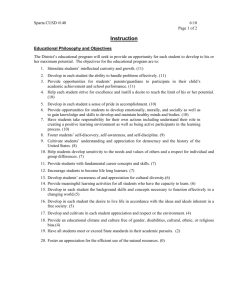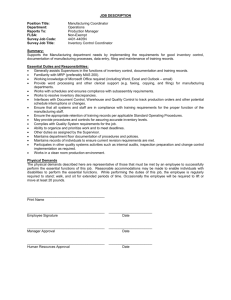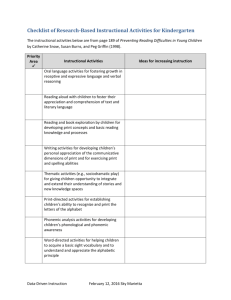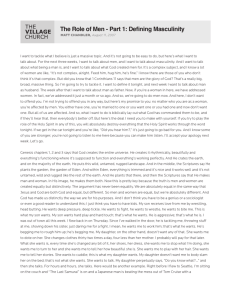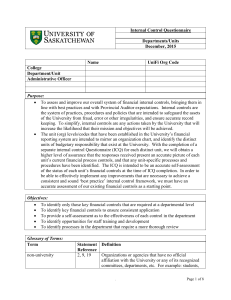Identifying and Building Upon Individual Core Teaching Goals
advertisement
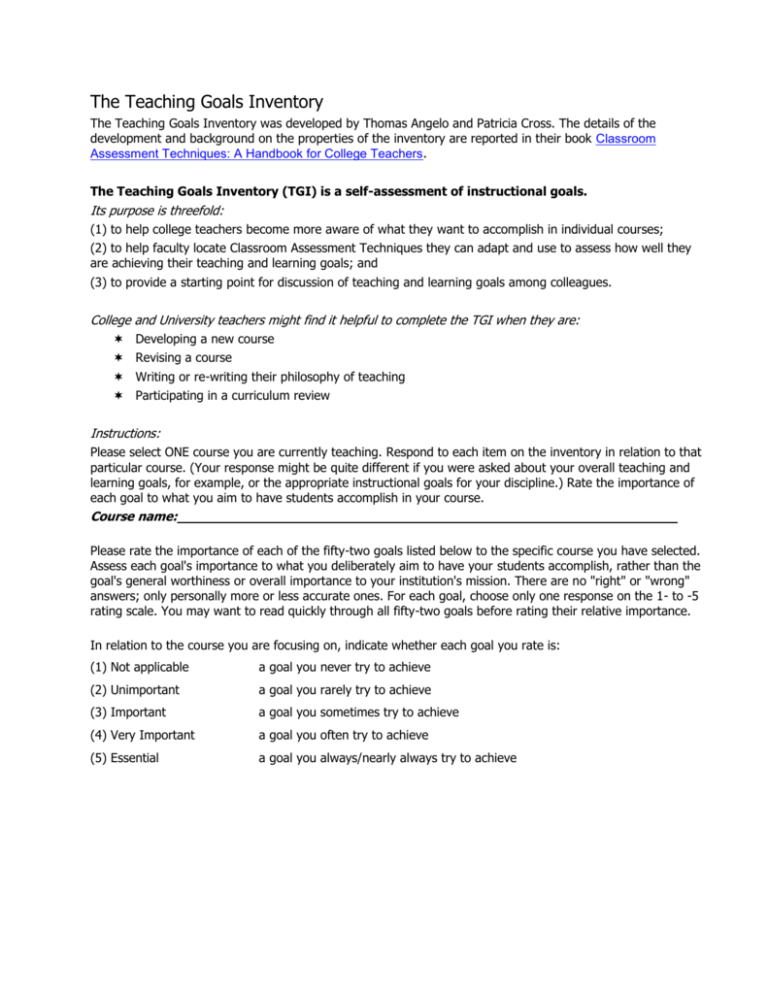
The Teaching Goals Inventory The Teaching Goals Inventory was developed by Thomas Angelo and Patricia Cross. The details of the development and background on the properties of the inventory are reported in their book Classroom Assessment Techniques: A Handbook for College Teachers. The Teaching Goals Inventory (TGI) is a self-assessment of instructional goals. Its purpose is threefold: (1) to help college teachers become more aware of what they want to accomplish in individual courses; (2) to help faculty locate Classroom Assessment Techniques they can adapt and use to assess how well they are achieving their teaching and learning goals; and (3) to provide a starting point for discussion of teaching and learning goals among colleagues. College and University teachers might find it helpful to complete the TGI when they are: Developing a new course Revising a course Writing or re-writing their philosophy of teaching Participating in a curriculum review Instructions: Please select ONE course you are currently teaching. Respond to each item on the inventory in relation to that particular course. (Your response might be quite different if you were asked about your overall teaching and learning goals, for example, or the appropriate instructional goals for your discipline.) Rate the importance of each goal to what you aim to have students accomplish in your course. Course name: Please rate the importance of each of the fifty-two goals listed below to the specific course you have selected. Assess each goal's importance to what you deliberately aim to have your students accomplish, rather than the goal's general worthiness or overall importance to your institution's mission. There are no "right" or "wrong" answers; only personally more or less accurate ones. For each goal, choose only one response on the 1- to -5 rating scale. You may want to read quickly through all fifty-two goals before rating their relative importance. In relation to the course you are focusing on, indicate whether each goal you rate is: (1) Not applicable a goal you never try to achieve (2) Unimportant a goal you rarely try to achieve (3) Important a goal you sometimes try to achieve (4) Very Important a goal you often try to achieve (5) Essential a goal you always/nearly always try to achieve 1 2 3 4 5 1 2 3 4 5 1 2 3 4 5 1 2 3 4 5 1 2 3 4 5 1 2 3 4 5 1 2 3 4 5 1 2 3 4 5 1 2 3 4 5 1 2 3 4 5 1 2 3 4 5 1 2 3 4 5 1 2 3 4 5 1 2 3 4 5 1 2 3 4 5 1 2 3 4 5 1 2 3 4 5 1 2 3 4 5 1 2 3 4 5 1 2 3 4 5 1 2 3 4 5 1. Develop ability to apply principles and generalizations already learned to new problems and situations 2. Develop analytic skills 3. Develop problem-solving skills 4. Develop ability to draw reasonable inferences from observations 5. Develop ability to synthesize and integrate information and ideas 6. Develop ability to think holistically: to see the whole as well as the parts 7. Develop ability to think creatively 8. Develop ability to distinguish between fact and opinion 9. Improve skill at paying attention 10. Develop ability to concentrate 11. Improve memory skills 12. Improve listening skills 13. Improve speaking skills 14. Improve reading skills 15. Improve writing skills 16. Develop appropriate study skills, strategies, and habits 17. Improve mathematical skills 18. Learn terms and facts of this subject 19. Learn concepts and theories in this subject 20. Develop skill in using materials, tools, and/or technology central to this subject 21. Learn to understand perspectives and values of this subject 1 2 3 4 5 1 2 3 4 5 1 2 3 4 5 1 2 3 4 5 1 2 3 4 5 1 2 3 4 5 1 2 3 4 5 1 2 3 4 5 1 2 3 4 5 1 2 3 4 5 1 2 3 4 5 1 2 3 4 5 1 2 3 4 5 1 2 3 4 5 1 2 3 4 5 1 2 3 4 5 1 2 3 4 5 1 2 3 4 5 1 2 3 4 5 1 2 3 4 5 1 2 3 4 5 22. Prepare for transfer or graduate study 23. Learn techniques and methods used to gain new knowledge in this subject 24. Learn to evaluate methods and materials in this subject 25. Learn to appreciate important contributions to this subject 26. Develop an appreciation of the liberal arts and sciences 27. Develop an openness to new ideas 28. Develop an informed concern about contemporary social issues 29. Develop a commitment to exercise the rights and responsibilities of citizenship 30. Develop a lifelong love of learning 31. Develop aesthetic appreciation 32. Develop an informed historical perspective 33. Develop an informed understanding of the role of science and technology 34. Develop an informed appreciation of other cultures 35. Develop capacity to make informed ethical choices 36. Develop ability to work productively with others 37. Develop management skills 38. Develop leadership skills 39. Develop a commitment to accurate work 40. Improve ability to follow directions, instructions, and plans 41. Improve ability to organize and use time effectively 42. Develop a commitment to personal achievement 1 2 3 4 5 1 2 3 4 5 1 2 3 4 5 1 2 3 4 5 1 2 3 4 5 1 2 3 4 5 1 2 3 4 5 1 2 3 4 5 1 2 3 4 5 1 2 3 4 5 43. Develop ability to perform skillfully 44. Cultivate a sense of responsibility for one's own behavior 45. Improve self-esteem/self-confidence 46. Develop a commitment to one's own values 47. Develop respect for one's own values 48. Cultivate emotional health and well-being 49. Cultivate physical health and well being 50. Cultivate an active commitment to honesty 51. Develop capacity to think for oneself 52. Develop capacity to make wise decisions 53. In general, how do you see your primary role as a teacher? (Although more than one statement may apply, please choose only one.) Teaching students facts and principles of the subject matter Providing a role model for students Helping students develop higher-order thinking skills Preparing students for jobs/careers Fostering student development and personal growth Helping students develop basic learning skills
